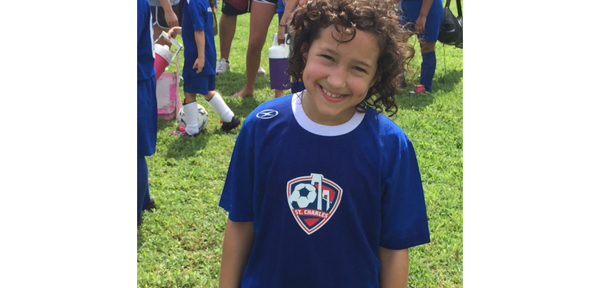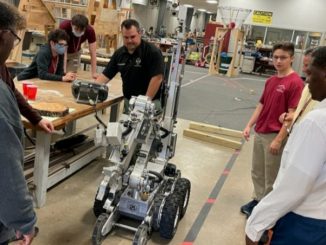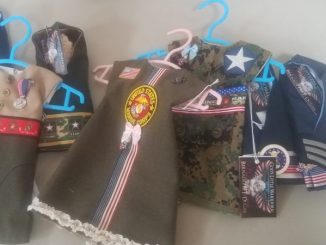
After battle with leukemia, program helps Ethel Schoeffner student find normalcy
When Rylie Richards was diagnosed with leukemia three years ago at the age of six, her mother Tracie no longer had time to plan for the normal day-to-day realities of raising a child that many may take for granted. Things like schooling, for a time, were the furthest thing from her mind.
“It was all about survival,” the mother said. It was, and indeed, Rylie has proven to be a fighter and a survivor. She completed chemotherapy treatment in 2014 and, while there’s no guarantee the illness is gone forever, she’s kept it at bay and her outlook is strong.
As one would expect, that battle against cancer was front and center the top priority for Rylie’s family.
When the young girl became strong enough to return to normal activities, Tracie Richards said her daughter began to ask about returning to school — Rylie had been home-schooled for much of the time during treatment, but longed to return to a regular school routine to meet friends and classmates at Ethel Schoeffner Elementary.
Likewise, Tracie longed to see Rylie happy and back in her element, but there were concerns. Rylie lost her hair during chemotherapy treatment and has had to deal with a great deal of physical weakness and illness.
“Socially, she was very lonely (while undergoing treatment),” Tracie said. “She was anxious to meet friends. I became a little panicked because there was a lot I wasn’t sure about. What would the psychological toll of all of this be on her? Who will be the teacher, and will they know how to deal with a situation like this? Will she be behind everyone else and how will that play out? And how would the other students react to her?”
Help was on the way, though. Tracie researched and learned of the Trish Greene Back to School Program for Children with Cancer. Established by the Leukemia & Lymphoma Society, the program aims to educate school personnel, parents, and healthcare professionals on the cognitive and late effects of childhood cancer treatment and to improve the transition of childhood cancer survivors from the hospital or clinic to the classroom. The program was established in 1999 and named for Trish Greene, the LLS’ former senior vice president who passed away after developing the idea for the program.
“The Trish Greene program gave me a map,” Tracie said.
“There were a lot of variables I hadn’t thought about. They coached us on how to be the best advocate for our child.”Through the program, school students and education and health faculty are educated on a number of topics, such as how to alleviate and handle a child’s fears about returning to school, which can include the reactions of friends and other students, what will happen when the student falls behind on classwork and homework and what new, unfamiliar routines will entail.
“Extra accommodations can be made to make the transition much smoother,” said Tracy Orwig, Director of Patient Access for the LLS. “Allotting extra test-taking time or more bathroom breaks, or lifting a ‘no-hat’ rule if one is in place … then later on, the issues with processing speed, math, are things that can be side effects of chemotherapy. We help schools create an accommodation plan.”
Orwig said the program also offers books and materials to the schools as well as parents. One example is the film, “Why, Charlie Brown, why?” which sees the iconic cartoon character learning to take care of a classmate returning following cancer treatment.
“When a child is medically ready to go back, we want to facilitate awareness and do everything we can to help that child feel comfortable,” Orwig said. “Rylie’s story is a prime example of how the program is utilized.”
Tracie said subjects were covered with the students including what it means to be a good friend, and how to care for her; things like the importance of washing hands as to not spread germs to Rylie, who could be very prone to illness.
The students were also able to ask questions before Rylie’s return.
“Someone asked if Rylie was going to die,” Tracie said. “A lot of them knew people who had died from cancer, aunts and uncles … we were glad they asked because we wanted to address that, but we didn’t want Rylie to have to. We were able to address their concerns before she got there.”
The program has already paid dividends. After her second day of school, Tracie saw Rylie get off her school bus with a different look than when she had left her home that morning: she had shed the wig she had begun using following chemotherapy.
“I freaked out a little at first. We jumped through a lot of hoops to get that wig,” Tracie said with a laugh. “I was afraid she’d lost it. I asked, ‘Where’s your hair?’ And she said the other kids thought she looked just fine without it.“I couldn’t help but laugh hysterically. It was a well of emotions that broke loose when she said that.”
Tracie said the program, which includes a yearly refresher meeting with Rylie’s teachers, allowed her family “a chance to breathe.”
“Everyone’s done such a tremendous job,” she said. “The (other students) were great and made her feel back to normal.”
Much credit simply has to go to Rylie herself as well. A cheerful child that Tracie said has never had a problem making friends, Rylie’s positive attitude about her plight tends to put others at ease.
“She’s such a happy little girl,” Tracie said. “After she was diagnosed, we set out to provide Rylie with as many happy moments as we possibly could while we still had her, and if she beat this, she would be better for it and there would simply be a lot of good things to come.”





Be the first to comment